There was an unexpected friendship formed during graduation week between Toowoomba supporter Marilyn and two of our graduates.
Marilyn and her husband, David, had been sponsoring the scholarship of talented musician, and stand-out student, Silvesta until he sadly passed away in the middle of his Form 6 year.
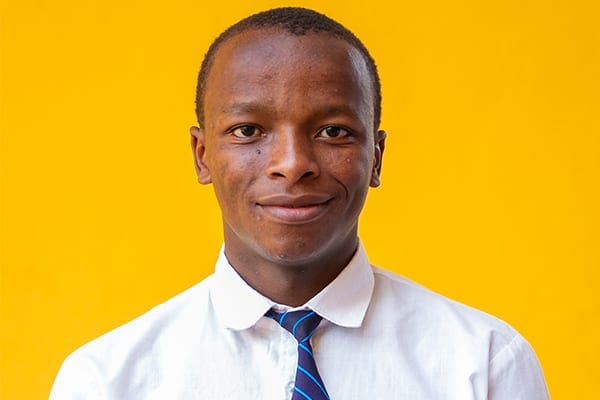
Determined to help honour his legacy, and help his fellow graduates in any way she could, Marilyn still travelled to Arusha for the Form 6 graduation ceremony of Silvesta’s class.
As soon as she stepped onto the Smith Secondary Campus she was met by the warm smiling faces of Evance and Rahim who had been Silvesta’s best friends.
“It was a total surprise that these two bright young men looked after me. They gave me a tour around the campus. Because of our afternoon I learnt more about Silvesta and I was also able to do some career counseling with them,” Marilyn said.
With Rahim hoping to study Linguistics after his Community Service Year with the Beyond St Jude’s program, Marilyn was able to impart some wisdom, with her background also in Linguistics.
The camaraderie between the three, continued through to graduation day. Marilyn was able to spend a heartwarming afternoon with Rahim and Evances’ families and presented them with traditional Australian gifts.
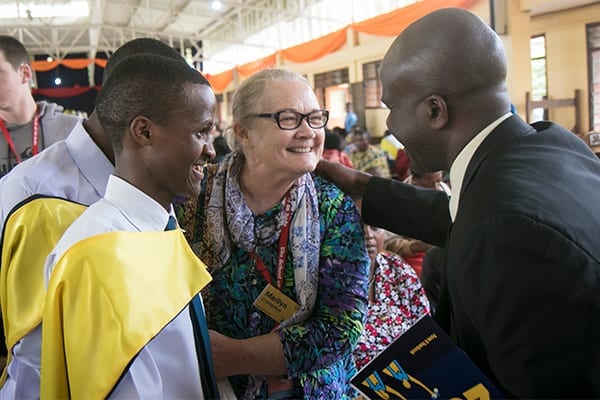
For graduate Rahim, Marilyn’s presence added something special to his big day. “The best thing I’ve learnt from Marilyn is if something goes wrong you don’t stop doing it, you keep going. She said that even though Silvesta is gone she won’t stop helping St Jude’s,” Rahim recalled.
Since meeting Rahim, Marilyn has decided that she and her husband will sponsor Rahim’s scholarship for his Community Service Year and will continue to be teaching, boarding and transport supporters.
The legacy of Marilyn’s visit and Silvesta’s memory will remain in the hearts of everyone at St Jude’s.
“We were presented with some words from Marilyn and the document is now posted outside the library, so every student who comes and goes from the library can remember them both,” Rahim smiled.
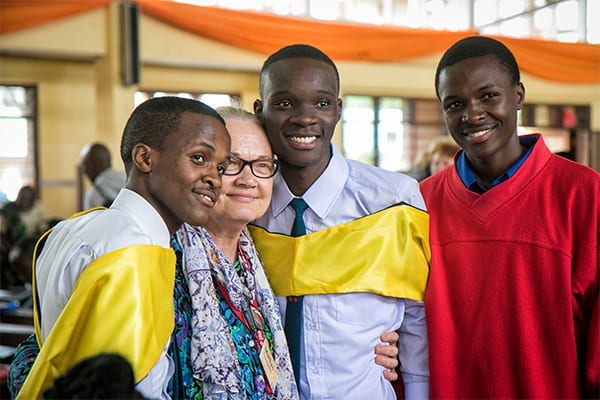
A gesture that brought tears to Marilyn’s eyes.
“I am not just connected with one student, I now have three connections and I know they are going to make a difference to their country,” Marilyn shared.
Below is an excerpt from Marilyn’s words that every secondary student and visitor can read outside the Smith library.
“Over the years, we have supported the school and one of your students, Silvesta who sadly passed away in 2018. We observed through many letters we received from him, the change from a young boy to a young man with future aspirations who learnt through education, sport and music. We appreciate the opportunity given to us to support this wonderful young man and the school and importantly, its people- the teachers, the many support staff and the students. It has been a privilege that my husband and I have been involved with this school. We aim to continue to support the efforts of all those from the School of St Jude as they seek to assist all of their students to ‘become moral and intellectual leaders in the country.’ It is only through education that people can change the world. The students have the opportunity to become life-long learners from the skills they have acquired at St Jude’s. The School of St Jude continues to educate and prepare their students to be noble citizens for their country.”
Taste testing Australian icon 'Vegemite' by the spoonful, before embarking on a trip of a lifetime to its country of origin, is a cultural exchange St Jude’s graduate Godwin never thought he’d experience. “It tastes bitter and weird,” Godwin said, laughing, with a mouthful of Vegemite.
“But seriously I am feeling very excited because I’ve never been to Australia, or even out of Tanzania before, and of course I once dreamed of going but I knew I had no means to go there.” he continued.
During Godwin’s childhood he lived in a one-room mud house, his single mother struggling to make ends meet to pay for food, clothes and the fees to keep Godwin in school, but she knew education was the only weapon to escape the poverty they were faced with.
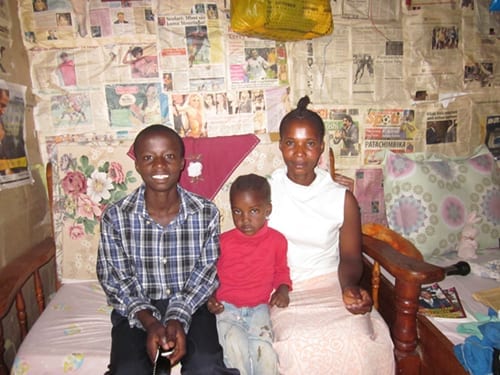
More than a decade on, with the guidance of the St Jude’s community, and incredible resilience, Godwin has not only topped classes at St Jude’s, and been a volunteer teacher at an under-resourced local government school, he has also successfully earned a full scholarship to study a Bachelor of Electrical Engineering in New York.
But first - following an invitation from St Jude’s Founder, Gemma Sisa - to a whirlwind speaking tour to Australia, and boy is he ready to go!
“The importance of sharing my story is to let the people who are supporting The School St Jude know that their support is really worth it and it’s giving young people an opportunity,” Godwin said.
He's very much hoping the crowds, expected to reach 700 at some events, will take away this message from their time with the St Jude’s team.
“This education is more than education, because it opens new doors in our lives. You ignite the flame and that fire will start bigger fires and one day it’s going to be one huge fire. Whatever you can do for a person that is less privileged is really worthy, as that person will eventually be able to do something great to help their community.”
And he's a shining example of just that! In addition to his work in Australia, Godwin plans to learn from the lifestyle.
“Apart from doing speeches I’ll be interested in swimming at some beaches, as it will be my first time to swim. I heard about the saying ‘G’day mate’ when I met with Australians visiting the school but my accent isn’t so good. I understand the people there are very generous, they are ready to support each other and us,” Godwin said with a big smile.
Alongside Godwin on his first trip aboard, and assisting him with digesting Vegemite, is Alumni Coordinator, Maddie Kelly. Herself returning home to Australia to assist with the tour, after almost two years living and working at the school in Arusha.
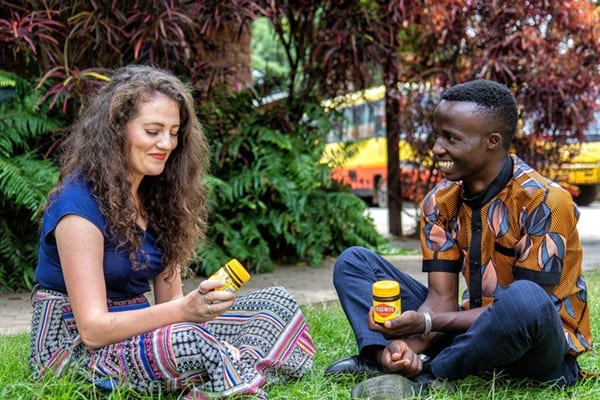
“I think Godwin is going to be an exceptional representative of St Jude’s and all our students. He’s already overcome so many challenges in his life and he understands the importance of what supporters do for St Jude’s,” Maddie shared.
“Godwin goes as a representative of one of eighteen hundred and he doesn’t take that responsibility lightly. There are more than a thousand like him that are trying to make the most of every opportunity they are given.”
Together they will not only navigate the initial cultural shocks when on Aussie soil, but will share the challenges facing 12 million Tanzanians living in poverty. His aim, to inspire you to spread the word about The School of St Jude and help fight poverty through education.
“My mum is really proud, she never thought her son would come this far,” Godwin said with wide eyes.
Judica, one of St Jude’s very first students, and soon to become one of our first university graduates, proudly flew the flag for Tanzania and for The School of St Jude as she retold her story and the story of the school.
Judica stepped up on to the podium and captured the 2,500-strong audience as she stood, dressed in her traditional kitenge, and sang the national anthem of Tanzania. She proudly shared her story of how, with the help of St Jude’s, her journey has taken her from extreme poverty to university, where she is currently studying Banking and Finance at the University of Dar Es Salaam.
Judica and the school’s Supporter Development Facilitator, Leonie, travelled to Dubai to give one of the keynote speeches at an International Association of Lions Clubs Forum for the India, South Asia, Africa and Middle East (ISAAME) region in December, attended by Lions members from 64 countries across this region, as well as special European and American guests.
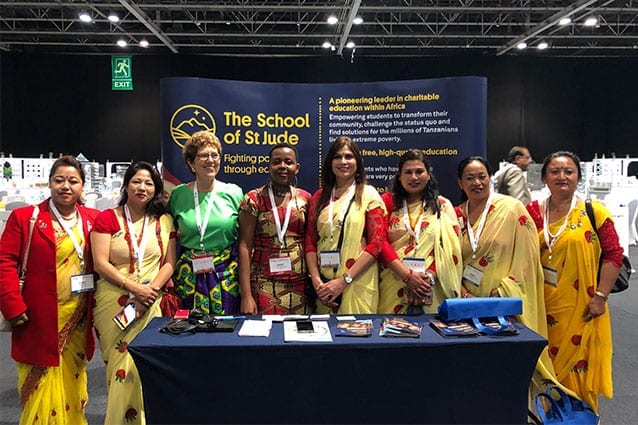
Judica and Leonie were also involved in an hour long presentation and Q&A with the Leos of the Middle East, being the younger members of the organisation.
Honouring the first female international president, the main theme of the event was “Advocate for the Achievement of Gender Equality and Women Empowerment”.
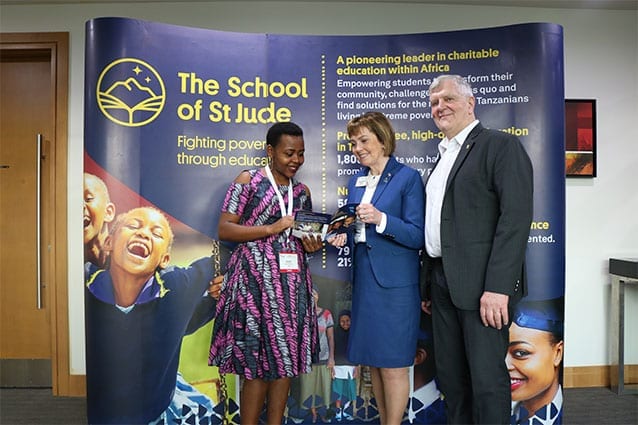
The event saw Middle East Lions Club launch its new special project with St Jude’s, “Fighting Poverty through Education” – the school’s motto. The Lions commitment to working with St Jude’s stems from the common goal of providing women and girls with equal access to education, as per the United Nations Sustainable Development Goal 5.
“At St Jude’s, they encourage Tanzanian youth to do more than just succeed,” said Augusto di Pietro, International Representative and Coordinating Officer for the Lions Clubs Middle East. “They empower them to become leaders and we are excited to work together to see more success stories like Judica’s.”
Good afternoon lovelies! Hope everyone around the world is enjoying the weekend, especially over here in the UAE where we have been treated to an extra day off! This month has been particularly busy at work which resulted in this post being published so late. Nevertheless, I am absolutely thrilled to share this month’s power lady, who is doing her bit to change the world.
Gemma Sisia is the founder of The School of St. Jude in Tanzania which provides a free high quality education to underprivileged children in Tanzania.
Gemma’s humble beginnings started in Australia where education was always a strong part of her life. It is through her belief that children from poor families should also have access to education that The School of St. Jude was created. Gemma’s fascination with helping African children started when she witnessed the news coverage of the Ethiopian famine, which led her to volunteer in Uganda and eventually set her life path to Tanzania.
Gemma overcame all obstacles which tried to falter with her goals, especially being a white woman trying to set up a school in a small closed society which she was not a native of. Through these hardships, she has established a successful school which has provided an education to over 1,800 students who may never have had the opportunity.
She is currently working on building a girls only school in order to encourage Muslim girls to get a proper education, as she noticed that most families do not allow a co-educational environment.
You must be wondering how this ties back to My Pink Diary? Well, although I have never met Gemma, I was inspired by her story having spent half of my life in Africa and witnessing first hand how much poverty affects children.
This topic is very close to my heart as I had the opportunity to work with different organisations to help the youngsters whose lives were so different from mine in Nigeria. While it is difficult to change governmental systems and corrupt politicians, I strongly support and respect women like Gemma who take a stand and create a platform which encourages and empowers children to realise their full potential and to give them a future.
Enjoy her story!

Quick facts:
1. Tell us a little bit about yourself.
I have never been one to reflect, so find it difficult to describe myself. My priorities in life are being a good wife and mother. My family is the most important aspect of my life. I love establishing things, being involved in start-ups and am always willing to help others who, in turn, are working towards helping those less fortunate than themselves.
2. How do you handle difficult times in your life?
“This too will pass” – no matter how bad something appears, ride it out. I count it down – just get to noon, just get to 5pm – everything passes, you just need to be patient and wait it out.
3. What is your secret to achieving the right balance between your career, family, friends and doing what you really love?
I say ‘NO’. There are things that I know I would enjoy – like going out more – but I can’t. So, I say ‘NO’.
4. What are your hobbies?
I love organising family trips and adventures like going camping on a Saturday night, or going on safari with my husband and kids. It’s magic away from the bustle – just quiet time with my family and the sounds of the animals in the dark. Getting away with family is a hobby, a passion and my idea of complete happiness.
5. What are your tips for happiness?
Enjoy the little things – they are the most precious. It makes me happy to listen to the next student who walks in and tells me what he/she is doing with their life since leaving St Jude’s. It makes me happy to attend a formal event, which has been completely organised by my staff and like other guests, I learn what is happening as the evening progresses, without having zero input into the organisation. The best time of the day is an evening walk with my kids and our dogs. All little things, but all so precious in the scheme of life.
6. Who is your role model or someone you look up to?
As a young girl, I kept a picture of Mother Teresa on my wall. Now, as an adult, I know my true heroes were my parents. They instilled in me the importance of education, faith and a willingness to help others. They were always counselling or helping others, doing things for the community. We had a pile of mattresses stored at home for extra people who needed somewhere to stay. When my father died, there was an honour guard formed by so many people who society had turned their backs on and my father helped them. It was a real lesson on how much a little can mean to a lot.
7. What have been the most exciting milestones in your life?
Getting married and having my four wonderful children; the first day of school when we opened the gates of The School of St Jude and the first day of every school term as we welcome more and more children of all faiths and tribes, giving them a future their parents never dreamed possible. Watching our first set of graduates go into community service and then onward to university – and my next exciting milestone will be 2019 when our first students begin graduating from university going into the world as tertiary educated young men and women forging their way in the world.
8. If you could change one thing in the world right now, what would it be?
I’d do away with the need for bureaucracy! If people acted ethically and honestly, there would be no need to have myriads of rules and contracts, but sadly, that is not the world we currently live in.
9. There are still a lot of cultures and societies who frown upon successful women. Why do you think that is, and how can it change?
Fortunately, that has never been an issue for me in Tanzania and I have never been disadvantaged by being a woman. I have always been respected here. I grew up in an old-fashioned household where my father was always the head and with seven brothers, I am used to living and working with men. However, some men simply don’t like change and in fact have an irrational fear of change. At The School of St Jude, we have many male teachers and they are always encouraging the young female students to succeed, to seize their power and be a force in the world – after all, women are the first teachers in the home.
In Africa, girls are often considered second-class citizens and many families believe that it is a waste of time educating them, putting a lot of pressure on girls to drop out of school, but we are facilitating changes in traditional community mind-sets. St Jude’s firmly believes in the education of girls. The school does not discriminate when selecting students although over the years St Jude’s has educated more female than male students. Our female teachers and leaders are strong role models, and the school’s welfare team works through any issues of discrimination, both with the students and their families.
10. What advice can you offer for men and women, trying to balance a career, family and personal life?
Don’t measure yourself against others. Do what works for you and your situation. Don’t conform to social pressure. I need to work to be a happy mum – happy mum equals happy husband and kids. Create a family lifestyle that, as a woman, makes you happy. Set realistic expectations and be content – content and thankful for what you have.

The School of St Jude is a special project of UAE Lions Clubs. For more information please contact: augusto.dipietro@internationallionsclub.com
My Pink Diary (read the original article here).
The Lions Club in the Middle East have pledged to support the School of St Jude, an Arusha-based education centre, build a new girls secondary school for 600 students.
This was announced recently after the 16-year-old school participated in the Lions Clubs International Forum in Dubai where a special project ‘Fighting Poverty through Education’ was launched.
During the event, the school clearly stated its intention of providing women and girls with equal access to education as per the United Nations Sustainable Development Goal number five.
Currently the co-educational school, which runs primary and secondary wings, has a total of 1,800 pupils, 1,400 of whom are boarders in its three campuses in and around Arusha.
The proposed all-girls school hopes to admit 600 girls, according to Ms. Leonie Trubshoe, the school official in charge of communication and media matters.
The Lions clubs will actively support our drive to build a new girls secondary school for 600 students, she said, adding that this would ensure opening up more chances for those from the poor families.
We love to empower our female students. We provide an equal opportunity for all students regardless of religion, tribe or gender’, she told the Citizen.
About 60 per cent of all students at the education institution established by Ms. Gemma Sisia, an Australian national in 2002, are girls.
The School’s spokesperson could not reveal the estimated cost of the new campus for the girl students. It offers free education targeting the young learners from the poor families.
It is estimated that about 90 per cent of funds used for running the education centre, which employs 300 staff members, each year is raised in Australia and other countries abroad.
The St Jude School started with a campus in Moshono, followed later by a much larger and famous campus at Usa River (near the Ngurdoto Mountain Lodge) while the third one was set up at Moivaro.
The Tanzanian Citizen (read the original article here).
Gemma Sisia’s parents, Sue and Basil, fervently believed in the power of education to change the future.
The couple, who raised eight children on a sheep wool farm in New South Wales, Australia, made significant sacrifices to ensure that their seven sons and one daughter had excellent educational opportunities. They also were strong believers in community service.
“They had an open-door policy at home for people wanting to come, stay, and have someone to listen to them,” she says. “My parents constantly showed me how important it is to help others.”
So, it’s not surprising that after she graduated from the Universities of Melbourne, Northern Territory and New England at 22 years of age, she took her newly minted Bachelor of Science degree and Graduate Diploma in Education to Africa. She taught math, science, and sewing at an under-resourced private girls’ school in Uganda.
She loved the work but was aware that her students’ parents were wealthy enough to afford private school for their girls. Gemma and the local art teacher who were good friends often talked about how to break the cycle of poverty that was rampant in East Africa, particularly for underprivileged girls. They concluded that without raising the standards of education across the board in the region, no amount of foreign money could alleviate the widespread poverty.
“That’s where the seed of building a school was planted,” she said.
Then came a fateful trip to Tanzania to visit one of that nation’s beautiful wildlife parks – and Gemma fell in love with her safari guide. The two married, and while Gemma was looking forward to raising her own family (the couple has four children), she knew she also wanted to pursue her dream of a school that would provide an excellent education to Tanzania’s poorest children.
She confided her dream to a close friend in Australia, who gave her 10 dollars. Gemma promptly opened up a bank account with that first donation. Her father-in-law gifted her with two acres of land in the Arusha District of Tanzania, so she’d have a site for the school. And her father, Basil, introduced her to the Rotarians.
Gemma shared her dream with local Rotary clubs in and around New South Wales. She told them the startling statistics of how poverty wrecks havoc with education in East Africa: according to UNICEF, 70 percent of children aged 14–17 years in Tanzania are not enrolled in school. Less than 4 percent make it to the final two years of secondary education.
“Without our school, these students might not attend school at all, or if they were one of the lucky few, their schooling would have been in an under-resourced government school with a handful of teachers for every 1,000 pupils,” she says. “And without a good education, they won’t be able to gain skilled employment, and their families would continue to lead lives of perpetual economic struggle.”
Gemma was persuasive. By the end of her “speaking engagement” weekend, the Rotary clubs raised $20,000 towards the school. Not only that, teams of volunteers out of the clubs came to Arusha to build the two blocks of classrooms and a playground. The Brisbane Planetarium Club built the foundations of the school library.
Gemma named the school after the patron saint of hopeless causes, saying it is a nod to her unwavering faith in a cause that thousands of people, united by a shared dream, have worked tirelessly to support.
The School of St Jude opened in 2002 with a mere three students, but it grew quickly. Now enrollment is almost 2,000 and the school’s three campuses (one primary, one secondary and one boarding) are spread over 50 acres. All the students attend on full scholarships, which not only pay for their teachers, books and supplies, but transportation, school uniforms and at least one hot meal a day. Students old enough to board (over two-thirds of the pupils attending St Jude’s) live in dorms on campus and are provided three meals a day.
The school has a competitive and highly extensive application process.
Each year, over 3,000 candidates from government schools are invited to attend the selection process (where up to 150 places are available across first-grade, seventh-grade and ninth-grade). They complete a series of tests, with the youngest needing to show an enthusiasm for learning and some proficiency in Swahili, the native language, and the older students completing tests in math, science, and English. Ultimately, the children will be taught in English, as most universities and jobs in the key professions require fluency in English.
The students who show the most promise are then assessed as to their financial and social circumstances to make sure the family falls within the income guidelines and are truly deserving of a place at St Jude’s.
Once they are accepted, they are given a free, high-quality and varied education, plus resources to help them in their post-secondary education or training. The co-educational student body reflects a wide swath of Tanzanian society, with students representing numerous religions and tribes.
Seventeen years after opening its doors, the first few cohorts have graduated from the school. Gemma says that most of these 392 graduates have undertaken a year of community service, voluntarily teaching core subjects to thousands of children in local government schools who otherwise wouldn’t have had teachers. Many have now also gone on to study at universities in much-needed fields such as medicine, engineering, law, and education.
“A number of our students have earned international recognition for science and entrepreneurship,” she adds, “and we will soon be seeing our first university graduates!”
Throughout it all, Rotarians and other Australian-based donors have been the core of The School of St Jude supporters, with a now growing donor-base in America too. Gemma returns to Australia every year for a multi-week tour to drum up support as part of the school’s annual fundraising campaign. It’s day after day of meetings, presentation, and events to secure the millions of dollars it takes to pay for a staff of about 300 local teachers and support staff as well as food, books, supplies, and campus maintenance.
“It’s always a killer itinerary, but it’s essential,” she says. “There are hundreds of local workers and thousands of students depending on it.”
Cindy May, Cindy May Marketing (read the original article here).